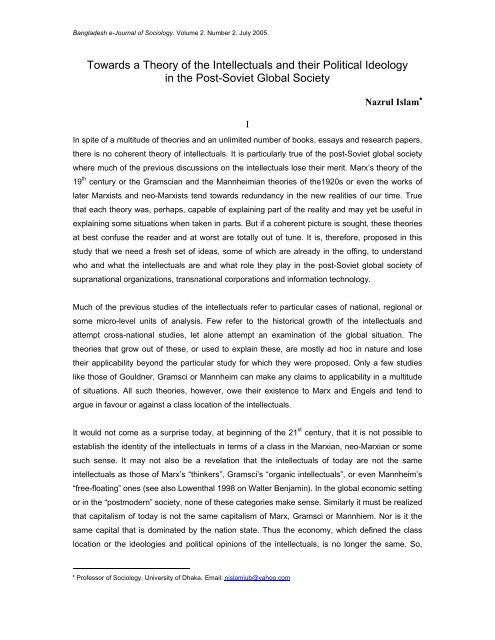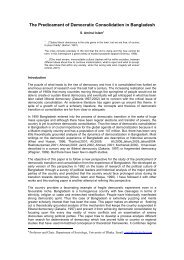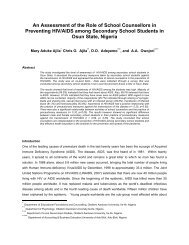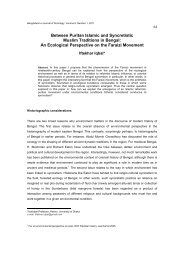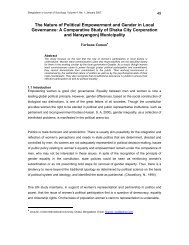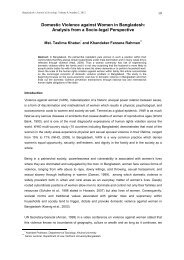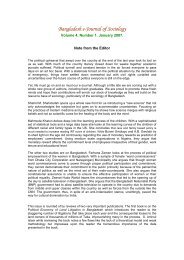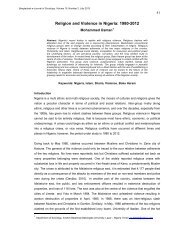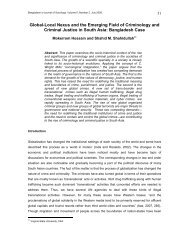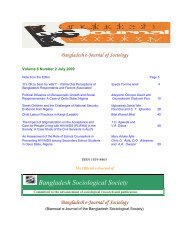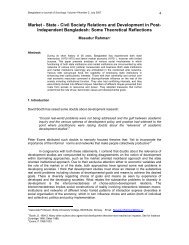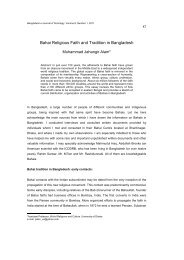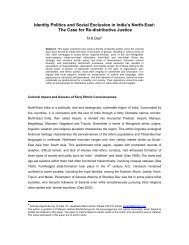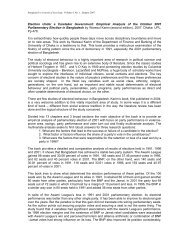Towards a Theory of the Intellectuals and their Political Ideology
Towards a Theory of the Intellectuals and their Political Ideology
Towards a Theory of the Intellectuals and their Political Ideology
- No tags were found...
Create successful ePaper yourself
Turn your PDF publications into a flip-book with our unique Google optimized e-Paper software.
Bangladesh e-Journal <strong>of</strong> Sociology. Volume 2. Number 2. July 2005.<strong>Towards</strong> a <strong>Theory</strong> <strong>of</strong> <strong>the</strong> <strong>Intellectuals</strong> <strong>and</strong> <strong>the</strong>ir <strong>Political</strong> <strong>Ideology</strong>in <strong>the</strong> Post-Soviet Global SocietyINazrul Islam •In spite <strong>of</strong> a multitude <strong>of</strong> <strong>the</strong>ories <strong>and</strong> an unlimited number <strong>of</strong> books, essays <strong>and</strong> research papers,<strong>the</strong>re is no coherent <strong>the</strong>ory <strong>of</strong> intellectuals. It is particularly true <strong>of</strong> <strong>the</strong> post-Soviet global societywhere much <strong>of</strong> <strong>the</strong> previous discussions on <strong>the</strong> intellectuals lose <strong>the</strong>ir merit. Marx’s <strong>the</strong>ory <strong>of</strong> <strong>the</strong>19 th century or <strong>the</strong> Gramscian <strong>and</strong> <strong>the</strong> Mannheimian <strong>the</strong>ories <strong>of</strong> <strong>the</strong>1920s or even <strong>the</strong> works <strong>of</strong>later Marxists <strong>and</strong> neo-Marxists tend towards redundancy in <strong>the</strong> new realities <strong>of</strong> our time. Truethat each <strong>the</strong>ory was, perhaps, capable <strong>of</strong> explaining part <strong>of</strong> <strong>the</strong> reality <strong>and</strong> may yet be useful inexplaining some situations when taken in parts. But if a coherent picture is sought, <strong>the</strong>se <strong>the</strong>oriesat best confuse <strong>the</strong> reader <strong>and</strong> at worst are totally out <strong>of</strong> tune. It is, <strong>the</strong>refore, proposed in thisstudy that we need a fresh set <strong>of</strong> ideas, some <strong>of</strong> which are already in <strong>the</strong> <strong>of</strong>fing, to underst<strong>and</strong>who <strong>and</strong> what <strong>the</strong> intellectuals are <strong>and</strong> what role <strong>the</strong>y play in <strong>the</strong> post-Soviet global society <strong>of</strong>supranational organizations, transnational corporations <strong>and</strong> information technology.Much <strong>of</strong> <strong>the</strong> previous studies <strong>of</strong> <strong>the</strong> intellectuals refer to particular cases <strong>of</strong> national, regional orsome micro-level units <strong>of</strong> analysis. Few refer to <strong>the</strong> historical growth <strong>of</strong> <strong>the</strong> intellectuals <strong>and</strong>attempt cross-national studies, let alone attempt an examination <strong>of</strong> <strong>the</strong> global situation. The<strong>the</strong>ories that grow out <strong>of</strong> <strong>the</strong>se, or used to explain <strong>the</strong>se, are mostly ad hoc in nature <strong>and</strong> lose<strong>the</strong>ir applicability beyond <strong>the</strong> particular study for which <strong>the</strong>y were proposed. Only a few studieslike those <strong>of</strong> Gouldner, Gramsci or Mannheim can make any claims to applicability in a multitude<strong>of</strong> situations. All such <strong>the</strong>ories, however, owe <strong>the</strong>ir existence to Marx <strong>and</strong> Engels <strong>and</strong> tend toargue in favour or against a class location <strong>of</strong> <strong>the</strong> intellectuals.It would not come as a surprise today, at beginning <strong>of</strong> <strong>the</strong> 21 st century, that it is not possible toestablish <strong>the</strong> identity <strong>of</strong> <strong>the</strong> intellectuals in terms <strong>of</strong> a class in <strong>the</strong> Marxian, neo-Marxian or somesuch sense. It may not also be a revelation that <strong>the</strong> intellectuals <strong>of</strong> today are not <strong>the</strong> sameintellectuals as those <strong>of</strong> Marx’s “thinkers”, Gramsci’s “organic intellectuals”, or even Mannheim’s“free-floating” ones (see also Lowenthal 1998 on Walter Benjamin). In <strong>the</strong> global economic settingor in <strong>the</strong> “postmodern” society, none <strong>of</strong> <strong>the</strong>se categories make sense. Similarly it must be realizedthat capitalism <strong>of</strong> today is not <strong>the</strong> same capitalism <strong>of</strong> Marx, Gramsci or Mannhiem. Nor is it <strong>the</strong>same capital that is dominated by <strong>the</strong> nation state. Thus <strong>the</strong> economy, which defined <strong>the</strong> classlocation or <strong>the</strong> ideologies <strong>and</strong> political opinions <strong>of</strong> <strong>the</strong> intellectuals, is no longer <strong>the</strong> same. So,• Pr<strong>of</strong>essor <strong>of</strong> Sociology, University <strong>of</strong> Dhaka. Email: nislamiub@yahoo.com
Bangladesh e-Journal <strong>of</strong> Sociology. Volume 2. Number 2. July 2005.2what needs to be understood at <strong>the</strong> outset, in any analysis <strong>of</strong> <strong>the</strong> intellectuals <strong>and</strong> <strong>the</strong>irideologies, is <strong>the</strong> nature <strong>of</strong> capitalism today.Back in <strong>the</strong> 1970s <strong>and</strong> 80s, what was seen by <strong>the</strong> dependency <strong>the</strong>orists <strong>and</strong> by Wallerstein as<strong>the</strong> world economy or <strong>the</strong> “world system” was merely <strong>the</strong> beginning <strong>of</strong> a process that has foundits culmination in <strong>the</strong> form <strong>of</strong> <strong>the</strong> global system <strong>of</strong> today, where <strong>the</strong> economy is no longerdominated by national capital or national capitalists. The dependency <strong>the</strong>orists in <strong>the</strong> 70s <strong>and</strong> <strong>the</strong>80s warned us about multinational or <strong>the</strong> transnational corporations as becoming more powerful<strong>and</strong> dominant than national capital. As a matter <strong>of</strong> fact even <strong>the</strong>n many such corporations werelarger in terms <strong>of</strong> capital than <strong>the</strong> GDPs <strong>of</strong> most countries <strong>of</strong> <strong>the</strong> Third world. Today such capitalhas taken a step fur<strong>the</strong>r <strong>and</strong> is now supranational, not bound by <strong>the</strong> territoriality <strong>of</strong> a nation state;it is global capital that dominates <strong>the</strong> world economic scene now.In Marx’s formulation capital was not expected, at least <strong>the</strong>oretically, to be limited within any stateboundaries. Marx <strong>and</strong> Engels in <strong>the</strong> Manifesto <strong>of</strong> <strong>the</strong> Communist Party made <strong>the</strong> global nature <strong>of</strong>capitalism abundantly clear, indeed, <strong>the</strong>y suggested that to achieve socialism, capitalism must beoverthrown globally <strong>and</strong> hence <strong>the</strong> call for “<strong>the</strong> workers <strong>of</strong> <strong>the</strong> world” to unite. But <strong>the</strong> economic<strong>and</strong> political reality <strong>of</strong> <strong>the</strong> times not only made capital nation-state based, it thrived <strong>and</strong> prosperedunder <strong>the</strong> protection <strong>of</strong> <strong>the</strong> state all through <strong>the</strong> 19 th century <strong>and</strong> much <strong>of</strong> <strong>the</strong> 20 th century. Thus,capitalism became an economy that was clearly international “amidst a world political system thatwas compartmentalized into separate nation-states” (Robinson <strong>and</strong> Harris 2000)The global nature <strong>of</strong> capital was also <strong>the</strong>orized by some followers <strong>of</strong> Marx, including Lenin, who,during <strong>the</strong> early 20 th century, warned about <strong>the</strong> eventual growth <strong>of</strong> capitalism into imperialism.These Marxists, including Lenin, predicted <strong>the</strong> role <strong>of</strong> multinational capital in such atransformation. However, it was dependency <strong>the</strong>ory <strong>and</strong> <strong>the</strong> world system <strong>the</strong>ory that elaborated<strong>the</strong> extent <strong>of</strong> this transformation <strong>of</strong> capital into multinational capital, <strong>and</strong> in particular itssubversive impact on <strong>the</strong> economy <strong>and</strong> society in <strong>the</strong> Third World.However, <strong>the</strong>se analyses, although trying to portray <strong>the</strong> historical reality <strong>of</strong> <strong>the</strong> growth <strong>of</strong>capitalism, were all limited to <strong>the</strong> explanation <strong>of</strong> capital in relation to <strong>the</strong> state or national capital.Theories <strong>of</strong> “capitalism as imperialism” saw <strong>the</strong> expansion <strong>of</strong> national capital as ruling <strong>the</strong> world.Even in <strong>the</strong> analysis <strong>of</strong> <strong>the</strong> dependency <strong>and</strong> world system <strong>the</strong>ories it was <strong>the</strong> capital <strong>of</strong> <strong>the</strong> US or<strong>the</strong> core countries that dominated <strong>the</strong> world in <strong>the</strong> form <strong>of</strong> multinational capital. The word“national” remained at <strong>the</strong> core <strong>of</strong> <strong>the</strong>se analyses.
Bangladesh e-Journal <strong>of</strong> Sociology. Volume 2. Number 2. July 2005.3Interestingly, however, even <strong>the</strong> proponent <strong>of</strong> <strong>the</strong> world system <strong>the</strong>ory is today aware <strong>of</strong> <strong>the</strong>phenomenal changes that are taking place in <strong>the</strong> world economy <strong>and</strong> places it beyond <strong>the</strong>realities portrayed in <strong>the</strong> world system <strong>the</strong>ory. Wallerstein in a recent essay (visit website below)argues that <strong>the</strong> capitalist world economic system, which has been in existence from <strong>the</strong> sixteenthcentury, is approaching its end, <strong>and</strong> is entering an era <strong>of</strong> transition to some new historical system.He feels that <strong>the</strong> capitalist world-economy is beset with structural strains, which it is no longer in aposition to h<strong>and</strong>le. Wallerstein identifies three sources <strong>of</strong> <strong>the</strong> structural strains which are a) nearcomplete “deruralization” <strong>of</strong> <strong>the</strong> world that has driven up <strong>the</strong> price <strong>of</strong> labour, b) <strong>the</strong> ecologicalexhaustion, which is increasing <strong>the</strong> cost <strong>of</strong> inputs, <strong>and</strong> c) <strong>the</strong> democratization <strong>of</strong> <strong>the</strong> world, whichhas increased <strong>the</strong> dem<strong>and</strong>s for public goods. He feels that a combination <strong>of</strong> <strong>the</strong>se three iscreating a massive long-term structural squeeze on pr<strong>of</strong>its from production <strong>and</strong> is making <strong>the</strong>system unpr<strong>of</strong>itable for <strong>the</strong> capitalists. He is, however, not certain which way <strong>the</strong> economy isactually moving <strong>and</strong> what kind <strong>of</strong> economic system lies in <strong>the</strong> future.But <strong>the</strong>re are o<strong>the</strong>rs who have a clearer picture <strong>of</strong> <strong>the</strong> future <strong>of</strong> <strong>the</strong> world economy <strong>and</strong> argue thatit is moving inexorably towards globalization. It was, perhaps, Barnett <strong>and</strong> Muller who, in <strong>the</strong>irGlobal Reach (1974), presented <strong>the</strong> first real exposition <strong>of</strong> <strong>the</strong> nature <strong>of</strong> global capital. Today, anendless array <strong>of</strong> literature is available to support <strong>the</strong> view that over <strong>the</strong> past few decadescapitalism has gone through a fundamental transformation. It has become global capitalism.According to Burbach <strong>and</strong> Robinson, (quoted by Robinson <strong>and</strong> Harris 2000) this globalizationinvolves an "epochal shift" in <strong>the</strong> development <strong>of</strong> <strong>the</strong> world capitalist system. In <strong>the</strong> nation-statephase <strong>the</strong> world was linked by commodity <strong>and</strong> financial flows in an integrated “international”market. In <strong>the</strong> global phase today <strong>the</strong> worldwide social linkage is an internal one (internal to <strong>the</strong>world as a whole, as <strong>the</strong> earlier “world system” <strong>the</strong>ory so forcefully argued) <strong>and</strong> <strong>the</strong> process <strong>of</strong>production has become supranational (Robinson <strong>and</strong> Harris 2000). So that global capital is notjust <strong>the</strong> mere collection <strong>of</strong> “national economies” or a quantitative extension <strong>of</strong> <strong>the</strong> same. It is aqualitatively different phase in <strong>the</strong> growth <strong>of</strong> capitalism, in which capital itself has become“supranational”.Finance capital is <strong>the</strong> most mobile <strong>and</strong> most deterritorialized factor <strong>and</strong> today $25 trillion incurrency move in <strong>the</strong> global financial market daily as compared to a mere $10 billion ininternational trade per day (Robinson <strong>and</strong> Harris 2000). Along with money capital, <strong>the</strong> productionprocess has also become deterritorialized. “Many previously nationally-based industries, such asautos, electronics, textiles, <strong>and</strong> computers, <strong>and</strong> even, in fact, services, are now thoroughlytransnationalized” (Robinson <strong>and</strong> Harris 2000). Globalization is also evidenced in <strong>the</strong>phenomenal increase <strong>of</strong> FDI <strong>and</strong> mergers among ever-larger corporations <strong>of</strong>ten across
Bangladesh e-Journal <strong>of</strong> Sociology. Volume 2. Number 2. July 2005.4continents. This global decentralization <strong>and</strong> dispersal <strong>of</strong> production, has become possible partlybecause <strong>of</strong> <strong>the</strong> growth <strong>of</strong> science <strong>and</strong> technology.IIThis is not <strong>the</strong> place to go into any detailed study <strong>of</strong> <strong>the</strong> process or <strong>the</strong> forces <strong>of</strong> thistransformation <strong>of</strong> capitalism from national to <strong>the</strong> supranational or global one. An excellent study <strong>of</strong>this trend towards globalization <strong>of</strong> capital is <strong>of</strong>fered by Robinson <strong>and</strong> Harris (2000). What isimportant to note here is that under such a condition class formation can no longer be boundedby <strong>the</strong> forces <strong>of</strong> national economies ei<strong>the</strong>r. Therefore, along with <strong>the</strong> transformation <strong>of</strong> <strong>the</strong> globaleconomy, a realignment <strong>of</strong> classes is also taking place, which no longer responds to <strong>the</strong> forces <strong>of</strong>national economies alone but become part <strong>of</strong> a supranational class formation.Robinson <strong>and</strong> Harris (2000) in <strong>the</strong>ir study focuses on what <strong>the</strong>y like to call a “transnational” rulingclass. They seek to establish that a transnational capitalist class has emerged, <strong>and</strong> that thistransnational class is in <strong>the</strong> process <strong>of</strong> becoming a global ruling class. The newly emerged classis in <strong>the</strong> process <strong>of</strong> creating a new globalist historic block, a new hegemonic block, consisting <strong>of</strong>various economic <strong>and</strong> political forces that have become <strong>the</strong> dominant sector <strong>of</strong> <strong>the</strong> ruling classthroughout <strong>the</strong> world, both in <strong>the</strong> developed countries <strong>of</strong> <strong>the</strong> North <strong>and</strong> those <strong>of</strong> <strong>the</strong> South as well.This bloc, well on its way to becoming <strong>the</strong> global ruling class, is composed <strong>of</strong> <strong>the</strong> “transnationalcorporations <strong>and</strong> financial institutions, <strong>the</strong> elite that manage <strong>the</strong> supranational economic planningagencies, major forces in <strong>the</strong> dominant political parties, media conglomerates, <strong>and</strong> technocraticelites <strong>and</strong> state managers in both North <strong>and</strong> South” (Robinson <strong>and</strong> Harris 2000). The block alsoincludes <strong>the</strong> cadre, bureaucratic managers <strong>and</strong> technicians who administer <strong>the</strong> supranationalagencies, such as <strong>the</strong> IMF, <strong>the</strong> World Bank, <strong>and</strong> <strong>the</strong> WTO, <strong>the</strong> states <strong>of</strong> <strong>the</strong> North <strong>and</strong> <strong>the</strong> South,<strong>and</strong> o<strong>the</strong>r transnational forums.Leslie Sklair (quoted by Robinson <strong>and</strong> Harris 2000) similarly identifies this new class as beingformed by <strong>the</strong> executives <strong>of</strong> transnational corporations, “globalizing bureaucrats, politicians, <strong>and</strong>pr<strong>of</strong>essionals", <strong>and</strong> "consumerist elites" in <strong>the</strong> media <strong>and</strong> <strong>the</strong> commercial sector. Sklair alsoargues that this capitalist class is no longer tied to territoriality or driven by national competition.The global ruling class is also active in forming a global state apparatus. This is evident both in<strong>the</strong> economic <strong>and</strong> political spheres. The World Bank, IMF, WTO, UN, European Union, G7,OECD etc. are some such examples to that end. The global class “has directly instrumentalizedthis TNS (Transnational State, or global state) apparatus, exercising a form <strong>of</strong> transnational state
Bangladesh e-Journal <strong>of</strong> Sociology. Volume 2. Number 2. July 2005.5power through <strong>the</strong> multi-layered configuration <strong>of</strong> <strong>the</strong> TNS”. Like its supranational componententities (<strong>the</strong> WTO or EU etc.) this global state is also supranational.Robinson <strong>and</strong> Harris (2000) also try to argue that corresponding to <strong>the</strong> growth <strong>of</strong> this globalbourgeoisie, <strong>the</strong> transnational (global) proletariat is also taking shape. However, unlike <strong>the</strong>bourgeoisie, which is both a class in itself <strong>and</strong> for itself, <strong>the</strong> proletariat has not yet attained <strong>the</strong>class consciousness, that is, it is not yet a class for itself. “The proletariat worldwide is as well in<strong>the</strong> process <strong>of</strong> transnational class formation. A transnational working class is increasingly areality, a class-in-itself. But it is not yet for-itself.” They feel that it is mainly because <strong>of</strong> <strong>the</strong>continued existence <strong>of</strong> <strong>the</strong> national-state <strong>and</strong> uneven development that class-consciousness islacking.In any case, this global society is increasingly crystallizing into stratified classes or classfragments.Robinson <strong>and</strong> Harris (2000) argue that below <strong>the</strong> transnational elite or <strong>the</strong> ruling classis “a small <strong>and</strong> shrinking layer <strong>of</strong> middle classes who exercise very little real power but who –pacified with mass consumption – form a fragile buffer between <strong>the</strong> transnational elite <strong>and</strong> <strong>the</strong>world's poor majority”. Thus, <strong>the</strong> global society is increasingly being characterized by a threetieredsocial structure. “The first tier is made up <strong>of</strong> some 30-40 percent <strong>of</strong> <strong>the</strong> population in corecountries <strong>and</strong> less in peripheral countries, those who hold "tenured" employment in <strong>the</strong> globaleconomy. The second tier, some 30 percent in <strong>the</strong> core <strong>and</strong> 20-30 percent in <strong>the</strong> periphery, forma growing army <strong>of</strong> "casualized" workers. The third tier, some 30 percent <strong>of</strong> <strong>the</strong> population in <strong>the</strong>core capitalist countries, <strong>and</strong> some 50 percent or more in peripheral countries, who are redundantto <strong>the</strong> system.According to Robinson <strong>and</strong> Harris (2000) <strong>the</strong>se "casualized" workers face chronic insecurity in<strong>the</strong> conditions <strong>of</strong> <strong>the</strong>ir employment <strong>and</strong> <strong>the</strong> absence <strong>of</strong> any collective insurance against riskpreviously assured by <strong>the</strong> welfare state. The third tier who is “structurally excluded fromproductive activity” similarly remains completely unprotected, as <strong>the</strong> welfare <strong>and</strong> developmentaliststates are “dismantled”. They comprise <strong>the</strong> "superfluous" population <strong>of</strong> global capitalism (see alsoHoogvelt, 1997) <strong>the</strong> caring <strong>of</strong> whom under <strong>the</strong> system is left unto <strong>the</strong>mselves. In <strong>the</strong> absence <strong>of</strong><strong>the</strong> welfare state <strong>the</strong> responsibility for care <strong>and</strong> protection <strong>of</strong> this superfluous population is beingdiverted to <strong>the</strong>se helpless beings under <strong>the</strong> guise <strong>of</strong> “community empowerment” <strong>and</strong> <strong>the</strong> such.Hoogvelt notes that an attempt is being made by a section <strong>of</strong> <strong>the</strong> ruling bloc to organize "<strong>the</strong> poor<strong>and</strong> <strong>the</strong> marginalized to care for <strong>and</strong> contain <strong>and</strong> control <strong>the</strong>mselves" (1997:149) Thephenomenal growth in <strong>the</strong> NGO activities world wide, <strong>and</strong> <strong>the</strong> poorer countries in particular,attests to that effort.
Bangladesh e-Journal <strong>of</strong> Sociology. Volume 2. Number 2. July 2005.9<strong>the</strong> same group. Bookchin (1991) also uses <strong>the</strong> term intelligentsia to identify <strong>the</strong> same group butexcludes <strong>the</strong> academics from consideration as “true intellectuals”. We shall look at <strong>the</strong>significance <strong>of</strong> this exclusion <strong>of</strong> <strong>the</strong> academics later. Edward Said (2001) makes a distinctionbetween <strong>the</strong> “writer” <strong>and</strong> <strong>the</strong> intellectual, in which he sees <strong>the</strong> "writer" as a person who producesliterature--that is, a novelist, poet, dramatist <strong>and</strong> has a greater prestige in society while for him <strong>the</strong>intellectual belongs to <strong>the</strong> slightly debased <strong>and</strong> parasitic class <strong>of</strong> "critics", although at <strong>the</strong>beginning <strong>of</strong> <strong>the</strong> twenty-first century, he adds, <strong>the</strong> writer has taken on <strong>the</strong> intellectual's adversarialattributes <strong>of</strong> speaking <strong>the</strong> truth <strong>and</strong> supplying a dissenting voice.In a similar manner Denis Smith (2001) distinguishes between those intellectuals who are“useful”, mainly to <strong>the</strong> “people in power” <strong>and</strong> <strong>the</strong> ‘genuine’ intellectuals who “want to actuallyinfluence <strong>the</strong> way people see <strong>and</strong> think about <strong>the</strong> world <strong>and</strong> in some cases <strong>the</strong>y want to help setsociety's agenda”. The “useful” intellectuals are “<strong>the</strong> cogs in a machine” <strong>the</strong>y are <strong>the</strong> “experts”.O<strong>the</strong>rs like Kellner (visit website below) tried to differentiate <strong>the</strong> “functional” from <strong>the</strong>critical/oppositional intellectuals. The critical/ oppositional intellectuals are <strong>the</strong> real intellectualswhile <strong>the</strong> “functional” intellectuals are <strong>the</strong> “specialists in legitimation <strong>and</strong> technical knowledge.”They are “mere technicians who devise more efficient means to obtain certain ends, or who apply<strong>the</strong>ir skills to increase technical knowledge in various specialized domains”This emphasis on <strong>the</strong> technical skills <strong>of</strong> a group <strong>of</strong> intellectuals was also voiced by Gouldner in<strong>the</strong> 1970s while trying to establish <strong>the</strong> intellectuals as forming a “new class”. In this formulationGouldner (1979) saw <strong>the</strong> intellectuals <strong>and</strong> <strong>the</strong> intelligentsia as <strong>the</strong> two elites within <strong>the</strong> new class.By employing <strong>the</strong> analogous term “intelligentsia”, Gouldner tried to identify a section <strong>of</strong> <strong>the</strong> rulingelite whose intellectual interests were primarily "technical." as opposed to <strong>the</strong> intellectuals whoseinterests are primarily critical, emancipatory, hermeneutic <strong>and</strong> hence <strong>of</strong>ten political (Don W.Dotson (visit website below). While <strong>the</strong> intellectuals are noted for <strong>the</strong>ir “love <strong>of</strong> books”, <strong>the</strong>“intelligentsia <strong>of</strong>ten wish nothing more than to be allowed to enjoy <strong>the</strong>ir opiate obsessions withtechnical puzzles”.Gouldner argues that <strong>the</strong> sociology <strong>and</strong> <strong>the</strong> social psychology <strong>of</strong> <strong>the</strong> occupational life <strong>of</strong> <strong>the</strong>intellectuals <strong>and</strong> <strong>the</strong> intelligentsia (mostly prefixed by ‘technical’) “differ considerably”. UsingKuhn’s notion <strong>of</strong> normal science <strong>and</strong> its focus on a single paradigm he argues that <strong>the</strong> technicalintelligentsia “concentrate on operations within <strong>the</strong> paradigm(s) <strong>of</strong> <strong>the</strong>ir discipline, exploring itsinner symbolic space, extending its principles to new fields, fine-tuning it”. In contrast, <strong>the</strong> field <strong>of</strong>activity <strong>of</strong> <strong>the</strong> intellectuals more commonly lack “consensually validated paradigms” <strong>and</strong> mayactually have “several competing paradigms”, because <strong>of</strong> which <strong>the</strong> intellectuals “<strong>of</strong>ten transgress<strong>the</strong> boundaries <strong>of</strong> <strong>the</strong> conventional division <strong>of</strong> labor in intellectual life.” (Gouldner 1979). Theybelong to <strong>the</strong> traditional humanities (Dotson).
Bangladesh e-Journal <strong>of</strong> Sociology. Volume 2. Number 2. July 2005.10M. Ignatief (visit website below) in his essay with <strong>the</strong> intriguing question “where have all <strong>the</strong>intellectuals gone?” also builds up <strong>the</strong> definition <strong>of</strong> <strong>the</strong> intellectuals on <strong>the</strong> distinction between <strong>the</strong>“humanist” <strong>and</strong> <strong>the</strong> scientists. Indeed, he argues that by definition <strong>the</strong> intellectual is “a generalistra<strong>the</strong>r (than a) specialist, a moralist ra<strong>the</strong>r than a technician”. Robert Nozick (1998), a Harvardpr<strong>of</strong>essor <strong>of</strong> philosophy, is more specific about <strong>the</strong> distinction between <strong>the</strong> two sets <strong>of</strong>intellectuals. He distinguishes between <strong>the</strong> intellectuals who work with “words” <strong>and</strong> those whowork with “numbers”. He likes to identify <strong>the</strong> intellectuals as those who “deal with ideas asexpressed in words, shaping <strong>the</strong> word flow o<strong>the</strong>rs receive”. He likes to call <strong>the</strong>m <strong>the</strong> “wordsmiths”.These wordsmiths include poets, novelists, literary critics, newspaper <strong>and</strong> magazine journalists<strong>and</strong> many pr<strong>of</strong>essors, “<strong>the</strong>y shape our ideas <strong>and</strong> images <strong>of</strong> society”. He argues that fromtreatises to slogans <strong>the</strong>y give us sentences to express ourselves. On <strong>the</strong> o<strong>the</strong>r h<strong>and</strong>, Nozick(1998) categorically excludes from his consideration as <strong>the</strong> intellectuals “those who primarilyproduce <strong>and</strong> transmit quantitatively or ma<strong>the</strong>matically formulated information” whom he likes tocall <strong>the</strong> “numbersmiths” <strong>and</strong> “ those working in visual media, painters, sculptors, cameramen” etc.This distinction made by Nozick (1998) is <strong>of</strong> vital importance to underst<strong>and</strong> <strong>the</strong> intellectuals <strong>and</strong><strong>the</strong>ir political ideologies today. It is seen very easily that <strong>the</strong> intellectuals who form <strong>the</strong> core <strong>of</strong> <strong>the</strong>new global elite belong to <strong>the</strong> category <strong>of</strong> numbersmiths <strong>and</strong> <strong>the</strong> visual media ra<strong>the</strong>r than <strong>the</strong>wordsmiths <strong>and</strong> <strong>the</strong> print media, although <strong>the</strong> printmedia is also increasingly becoming global.Yet, CNN is received in over 200 nations <strong>and</strong> territories while <strong>the</strong> New York Times is not. Thesenumbersmiths are <strong>the</strong> “experts from political, economic, scientific, social <strong>and</strong> technological fields.”They work as scientist, engineers, as well as managers in financial institutions <strong>and</strong> supranationalor global organizations <strong>and</strong> corporations.Thus, not all intellectuals are considered as “true” intellectuals. Only those who are trained in <strong>the</strong>humanities or work as novelists, poets, journalists <strong>and</strong> critics etc. are <strong>the</strong> true intellectuals. Thosetrained in <strong>the</strong> sciences <strong>and</strong> technologies or work in such pr<strong>of</strong>essions are not considered as “trueintellectuals”. They are mere experts <strong>and</strong> technicians.The second set <strong>of</strong> distinctions made in recent times is between those intellectuals who workwithin an institution <strong>and</strong> those who are free-lance. Bookchin (1991) distinguishes <strong>the</strong> intellectuals<strong>of</strong> <strong>the</strong> academia from <strong>the</strong> “true intellectuals”, whom he calls <strong>the</strong> “intelligentsia”. The intellectualsare <strong>the</strong> ones who are in <strong>the</strong> market as commodities <strong>and</strong> are absorbed by <strong>the</strong> academia as much
Bangladesh e-Journal <strong>of</strong> Sociology. Volume 2. Number 2. July 2005.12Although this figure seems to be ra<strong>the</strong>r high <strong>the</strong> fact remains that an ever-larger number <strong>of</strong>intellectuals are being recruited by <strong>the</strong> multinational corporations <strong>and</strong> supranationalorganizations.Of even greater consequence is <strong>the</strong> fact that <strong>the</strong>se jobs attract intellectuals from all over <strong>the</strong> world<strong>and</strong> are <strong>of</strong>ten truly global in terms <strong>of</strong> <strong>the</strong> personnel, although <strong>the</strong> representation from <strong>the</strong> firstworld may be disproportionately higher. Also, <strong>the</strong>se organizations disperse <strong>the</strong>ir personnel todistant countries <strong>and</strong> regions. Thus, it is a very likely scenario that a Bangladeshi computeranalyst graduating from a US university is working for a Japanese firm in Brazil. Thus, among <strong>the</strong>global organizations we may get two categories <strong>of</strong> intellectuals, one working within <strong>the</strong>ir owncountries for better pay <strong>and</strong> benefits compared to local jobs <strong>and</strong> <strong>the</strong> o<strong>the</strong>r category working for<strong>the</strong> global organizations for even better pay <strong>and</strong> benefits <strong>and</strong> working in countries <strong>and</strong> regions farfrom <strong>the</strong>ir place <strong>of</strong> origin or education <strong>and</strong> training.It is, thus, obvious that <strong>the</strong> intellectuals <strong>of</strong> today cannot be seen as a homogeneous group <strong>and</strong>that <strong>the</strong> distinction among <strong>the</strong> various categories not only separate <strong>the</strong>m into distinct groups, <strong>the</strong>nature <strong>of</strong> <strong>the</strong>ir jobs, terms <strong>of</strong> employment <strong>and</strong> <strong>the</strong>ir domain <strong>and</strong> even <strong>the</strong>ir place <strong>of</strong> work are all sodifferent <strong>and</strong> dispersed that it would be too naïve to assume that <strong>the</strong>y are alike in any manner.There are, <strong>the</strong>refore, several categories <strong>of</strong> intellectuals who need to be treated as separategroups <strong>of</strong> intellectuals. First, we have <strong>the</strong> distinction among <strong>the</strong>ir fields <strong>of</strong> specializations in terms<strong>of</strong> <strong>the</strong> humanities as opposed to <strong>the</strong> sciences <strong>and</strong> technology, <strong>the</strong>n <strong>the</strong> distinction among <strong>the</strong>institutional as opposed to <strong>the</strong> freelance. Within <strong>the</strong> institutional intellectuals are those in teaching<strong>and</strong> those in research, <strong>and</strong> <strong>the</strong>n <strong>the</strong>re are those working at <strong>the</strong> local level or <strong>the</strong> state <strong>and</strong>national corporations <strong>and</strong> those working for <strong>the</strong> global <strong>and</strong> multinational corporations <strong>and</strong>supranational organizations working within <strong>the</strong> country <strong>and</strong> again those working outside <strong>the</strong>country. In terms <strong>of</strong> broader categories we have <strong>the</strong> intellectuals from <strong>the</strong> humanities, <strong>the</strong>wordsmiths, working mostly at <strong>the</strong> local levels in state bureaucracies <strong>and</strong> as university pr<strong>of</strong>essorsor freelance writers, journalists etc. The o<strong>the</strong>r is <strong>the</strong> scientists, technicians, <strong>the</strong> numbersmiths,working in various research institutions in <strong>the</strong> universities, local corporations, <strong>and</strong> multinational<strong>and</strong> supranational organizations, <strong>of</strong>ten becoming supranational <strong>the</strong>mselves.Therefore, a distinction among <strong>the</strong> domains <strong>of</strong> <strong>the</strong>ir work is essential to fully appreciate <strong>the</strong> role <strong>of</strong><strong>the</strong> intellectuals. Martin argues that <strong>the</strong> political views <strong>of</strong> academics show much more variationbetween disciplines than any difference between academic attitudes <strong>and</strong> those <strong>of</strong> <strong>the</strong> generalpublic (Martin 1998). This becomes vital for <strong>the</strong> fact that some pr<strong>of</strong>essionals are not evenregarded as true intellectuals. Thus, for Gouldner <strong>the</strong> specialists or <strong>the</strong> technical experts are <strong>the</strong>
Bangladesh e-Journal <strong>of</strong> Sociology. Volume 2. Number 2. July 2005.13“intelligentsia” <strong>and</strong> not “intellectuals”. Nozick (1998) summarily dismisses <strong>the</strong> numbersmiths <strong>and</strong>visual media-persons from his consideration as intellectuals.VSuch distinctions are necessary because it is generally assumed that some intellectuals, <strong>the</strong>generalists, humanist or literary critics, <strong>the</strong> “wordsmiths”, play more <strong>of</strong> a public role ei<strong>the</strong>r infavour or in opposition to this or that political issue <strong>and</strong> seek to transform public opinions. Theyare <strong>the</strong> “public intellectuals”. The scientists, <strong>the</strong> specialist, <strong>the</strong> technician or <strong>the</strong> numbersmiths,are mostly indifferent to <strong>the</strong> social <strong>and</strong> political issues, indeed, <strong>of</strong>ten apolitical. Thus it is <strong>the</strong>irdomain <strong>of</strong> work as much as, if not more than, <strong>the</strong>ir earlier class location in <strong>the</strong> family or <strong>the</strong>irschooling (Brym 1980; 2001) that are seen as determinants <strong>of</strong> <strong>the</strong> role <strong>the</strong> intellectuals play inpublic life <strong>and</strong> is <strong>the</strong> key to <strong>the</strong>ir political opinions <strong>and</strong> ideologies.Historically <strong>the</strong> intellectuals have played an oppositional role in Europe <strong>and</strong> America <strong>and</strong> are,thus, expected to continue to play a similar political role. They were <strong>the</strong> critics in <strong>the</strong> Dreyfusaffair; <strong>the</strong>y were <strong>the</strong> critics that Benda laments about in his 1927 essay, The Treason <strong>of</strong> <strong>the</strong><strong>Intellectuals</strong>. They were <strong>the</strong> radicals <strong>and</strong> later <strong>the</strong> Left in most societies. According to Sartre "<strong>the</strong>duty <strong>of</strong> <strong>the</strong> intellectual is to denounce injustice wherever it occurs." The domain <strong>of</strong> <strong>the</strong> intellectualis “to write <strong>and</strong> speak within <strong>the</strong> public sphere, denouncing oppression <strong>and</strong> fighting for humanfreedom <strong>and</strong> emancipation.” (Kellner, see website below).Indeed, for many, <strong>the</strong> real intellectual is <strong>the</strong> one who plays a political role. Bookchin (1991),though he used <strong>the</strong> term intelligentsia, to identify <strong>the</strong> ‘true intellectuals’ argues that intelligentsia isa concept <strong>of</strong> Russian origin where it referred to <strong>the</strong> “people who thought <strong>and</strong> still lived in a publicarena, <strong>and</strong> who tried to create a public sphere.” For him Denis Diderot is an example <strong>of</strong> <strong>the</strong>intelligentsia “who wrote - virtually in poverty for much <strong>of</strong> his life - who read <strong>and</strong> was creative, whowalked <strong>the</strong> streets <strong>of</strong> Paris intoxicated by <strong>the</strong> life <strong>of</strong> <strong>the</strong> people, who played chess <strong>and</strong> wasinvolved in <strong>the</strong> discussions in <strong>the</strong> cafes, acting as a ferment, challenging authority everywherealong his way <strong>and</strong> going to prison for a period <strong>of</strong> time.” Thus for Bookchin (1991) <strong>the</strong> intelligentsiaare <strong>the</strong> people who not only engaged in thinking <strong>and</strong> writing but also “engaged in confrontationswith <strong>the</strong> system instead <strong>of</strong> shying away from <strong>the</strong>m.” The intelligentsia, (in Russia) went witho<strong>the</strong>rs to Siberia (on exile) <strong>and</strong> created enormous social ferment, <strong>the</strong>y worked outside <strong>the</strong>institutions <strong>and</strong> would ra<strong>the</strong>r create institutions for <strong>the</strong> masses that needed to underst<strong>and</strong> <strong>the</strong> realissues <strong>of</strong> <strong>the</strong> time.
Bangladesh e-Journal <strong>of</strong> Sociology. Volume 2. Number 2. July 2005.15organizations <strong>and</strong> who work at <strong>the</strong> local levels <strong>and</strong> between those who work within <strong>the</strong>ir owncountry <strong>and</strong> society <strong>and</strong> those who work outside.VIWe are now in a better position to underst<strong>and</strong> <strong>the</strong> political roles <strong>and</strong> ideologies <strong>of</strong> <strong>the</strong> intellectuals.As noted above <strong>the</strong> assumption that <strong>the</strong> intellectuals represent a position in <strong>the</strong> social structure<strong>and</strong> that <strong>the</strong>ir political opinions <strong>and</strong> ideologies are a mere reflection <strong>of</strong> that position is no longertenable. Analysts from Marx on ward have tried to identify this ideology <strong>and</strong> in most cases <strong>the</strong>intellectuals have been seen as occupying a position away from those <strong>of</strong> <strong>the</strong> basic classes, <strong>the</strong>proletariat <strong>and</strong> <strong>the</strong> capitalists, <strong>and</strong> <strong>the</strong>y were seen as mere deputies <strong>of</strong> <strong>the</strong> capitalists <strong>and</strong> serving<strong>the</strong>ir interests, although some have seen <strong>the</strong>m as classless or even belonging to <strong>the</strong> ruling class,if not forming <strong>the</strong> ruling class in itself.All <strong>the</strong>se have been argued in relation to a capitalist economy, <strong>of</strong>ten a socialist <strong>and</strong> not-socapitalistthird world economies, but <strong>the</strong>y have always been seen in a nation-state context. It hasbeen shown above that nei<strong>the</strong>r <strong>the</strong> nation state nor <strong>the</strong> capitalist economy, we were so familiarwith, exist today in a manner that a Marxist would find comfortable to relate to. Although <strong>the</strong>economy is yet to become totally global, whatever that may amount to, <strong>the</strong>re is today in existenceat least two sets <strong>of</strong> realities that confront <strong>the</strong> intellectuals as much as it confronts <strong>the</strong> rest <strong>of</strong> <strong>the</strong>world. One is <strong>the</strong> economy based in <strong>the</strong> nation state with its political <strong>and</strong> social settings affecting<strong>the</strong> day to day life <strong>of</strong> <strong>the</strong> most while <strong>the</strong> o<strong>the</strong>r, <strong>the</strong> global one, which is supranational <strong>and</strong> farremoved from <strong>the</strong> local level, almost an abstract entity for many. However, between <strong>the</strong>se twoextremes are many corporations <strong>and</strong> organizations, including state governments that deal invarious intermediary capacities between <strong>the</strong> two settings so that <strong>the</strong>re is no clear demarcation<strong>and</strong> that one set <strong>of</strong> reality gradually merges with <strong>the</strong> o<strong>the</strong>r.For <strong>the</strong> intellectuals, <strong>the</strong>refore, <strong>the</strong>ir work settings are also varied beginning with one at <strong>the</strong> localto <strong>the</strong> o<strong>the</strong>r at <strong>the</strong> global level with various intermediary locations. At <strong>the</strong> local level <strong>the</strong> intellectualis engaged in <strong>the</strong> academia as teacher <strong>and</strong> researcher, in <strong>the</strong> state administration, variousresearch positions in <strong>the</strong> corporations <strong>and</strong> as journalists, critics, free-lance writers etc. At <strong>the</strong>global level <strong>the</strong> intellectual workplace includes <strong>the</strong> research corporations, managerial <strong>and</strong>administrative work in <strong>the</strong> transnational corporations <strong>and</strong> supranational organizations <strong>and</strong>, asRobinson <strong>and</strong> Harris (2000) note, in various think tanks <strong>of</strong> <strong>the</strong> global organizations. In <strong>the</strong>intermediary positions are <strong>the</strong> administrators, technical experts, consultants with various
Bangladesh e-Journal <strong>of</strong> Sociology. Volume 2. Number 2. July 2005.18vary interest in <strong>the</strong> study <strong>of</strong> intellectuals <strong>and</strong> <strong>the</strong>ir political opinion originated from this debate.Starr (1995) notes that, “for much <strong>of</strong> this (20 th ) century, <strong>the</strong> principal debate among intellectualstook place between liberals <strong>and</strong> <strong>the</strong> left. The overriding question was socialism versus capitalism,revolution or radicalism versus reform”. Similarly, Ignatief (see website below) argues that formost <strong>of</strong> <strong>the</strong> twentieth century intellectuals enlisted on behalf <strong>of</strong> <strong>the</strong> “great narrative” battlebetween communism <strong>and</strong> capitalism. The battle gave point to <strong>the</strong>ir polemics <strong>and</strong> meaning to <strong>the</strong>irlives, with <strong>the</strong> loss <strong>of</strong> <strong>the</strong> “gr<strong>and</strong> narrative” <strong>of</strong> communism <strong>the</strong> intellectuals <strong>of</strong> today are lost.Thus, <strong>the</strong> end <strong>of</strong> <strong>the</strong> Soviet era has meant for <strong>the</strong> intellectuals, more than anything else, <strong>the</strong> loss<strong>of</strong> an alternative. For all through <strong>the</strong> past century one could debate over <strong>the</strong> prospect <strong>of</strong> analternative process <strong>of</strong> development, could visualize an alternative to capitalism <strong>and</strong> imperialismunder its sway. Suddenly that alternative is gone. This loss has produced an immense vacuum in<strong>the</strong> psyche <strong>of</strong> <strong>the</strong> intellectuals in general, <strong>and</strong> particularly among <strong>the</strong> Left, who suddenly find<strong>the</strong>mselves without a cause. Very suddenly <strong>the</strong> Left is gone so are <strong>the</strong> Left intellectuals.The loss <strong>of</strong> <strong>the</strong> Left <strong>and</strong> <strong>the</strong> Left intellectuals has direct <strong>and</strong> very important consequences for <strong>the</strong>intellectual community in general. First, <strong>the</strong> end <strong>of</strong> <strong>the</strong> Left has also meant <strong>the</strong> rise <strong>of</strong> <strong>the</strong> Right allover <strong>the</strong> world. The intellectuals seem to have taken a step to <strong>the</strong> right as <strong>the</strong> number <strong>of</strong>conservative intellectuals increase across <strong>the</strong> world. Starr (1995) has very aptly demonstrated <strong>the</strong>building up <strong>of</strong> this general trend in <strong>the</strong> USA in <strong>the</strong> recent decades. He notes that “where liberalintellectuals once found <strong>the</strong>mselves engaged in a debate with <strong>the</strong> left, <strong>the</strong>y now find <strong>the</strong>mselvesin a running debate with <strong>the</strong> right” He shows that during <strong>the</strong> past several decades, <strong>the</strong> number<strong>and</strong> vitality <strong>of</strong> conservative intellectuals have enormously increased, <strong>and</strong> many <strong>of</strong> <strong>the</strong>m, contraryto <strong>the</strong> conventional picture, flourish outside <strong>the</strong> academy in <strong>the</strong> foundations, think tanks <strong>and</strong>research organizations <strong>and</strong> <strong>the</strong> media. Thus he feels that <strong>the</strong> decline <strong>of</strong> intellectuals on <strong>the</strong> left<strong>and</strong> <strong>the</strong> rise <strong>of</strong> intellectuals on <strong>the</strong> right have dramatically changed <strong>the</strong> politics <strong>of</strong> ideas in <strong>the</strong>USA. So has it in most countries all over <strong>the</strong> world. In <strong>the</strong> past “Conservatism did not figure as anintellectual force in <strong>the</strong> same way; liberal intellectuals did not worry about <strong>the</strong>ir relation toconservatives”. To day <strong>the</strong>y are competing with <strong>the</strong> liberals for <strong>the</strong> center stage. The vacuumcreated by <strong>the</strong> exit <strong>of</strong> <strong>the</strong> Left has, thus, opened <strong>the</strong> prospect for <strong>the</strong> rise <strong>of</strong> <strong>the</strong> Right all over <strong>the</strong>world.Second, this loss <strong>of</strong> <strong>the</strong> Left has unfortunately also meant loss <strong>of</strong> <strong>the</strong> universal intellectual. Starr(1995) notes that today <strong>the</strong>re is a general lament about <strong>the</strong> loss <strong>of</strong> <strong>the</strong> intellectual. At <strong>the</strong> center <strong>of</strong>this lament is <strong>the</strong> fact that <strong>the</strong> intellectual in this conception is a wide-ranging moral <strong>and</strong> socialcritic, uncorrupted by <strong>the</strong> culture <strong>of</strong> <strong>the</strong> academy or <strong>the</strong> culture <strong>of</strong> commerce (Starr 1995), <strong>the</strong>type Jacoby would identify as <strong>the</strong> “universal” intellectual. These were mostly <strong>the</strong> intellectuals from
Bangladesh e-Journal <strong>of</strong> Sociology. Volume 2. Number 2. July 2005.19<strong>the</strong> Left. Thus, <strong>the</strong> end <strong>of</strong> <strong>the</strong> Left intellectual generally implies <strong>the</strong> end <strong>of</strong> <strong>the</strong> “universalintellectual” as well, <strong>the</strong> ones who would be concerned with <strong>the</strong> universal human values <strong>and</strong>decencies.Third, <strong>the</strong> disappearance <strong>of</strong> <strong>the</strong> intellectual as a universal voice has heralded in <strong>the</strong> rise <strong>of</strong> <strong>the</strong>intellectual who is concerned with <strong>the</strong> immediate <strong>and</strong> deal with <strong>the</strong>se on an ad hoc basis. Thus,Focault (quoted in R.C. Thomas 1988) talked about <strong>the</strong> coming in <strong>of</strong> <strong>the</strong> “specific intellectual” asopposed to <strong>the</strong> intellectuals who championed universal values. The universal intellectual wasrepresented by personalities such as Sartre <strong>and</strong> Voltaire, who were jurists <strong>and</strong> notables while <strong>the</strong>“specific intellectuals” are <strong>the</strong> savants or experts. Similarly Bauman (quoted in Kellner)distinguishes between those intellectuals who wish to legislate universal values, as opposed tothose intellectuals who work as interpreters mostly at <strong>the</strong> state level. Ignatief, more to our point,similarly draws <strong>the</strong> distinction between <strong>the</strong> “globalist” <strong>and</strong> <strong>the</strong> “particularist intellectuals”.Radicalism among <strong>the</strong> intellectuals in <strong>the</strong> past almost always pushed <strong>the</strong>m to <strong>the</strong> Left, to opposecapitalism <strong>and</strong> <strong>the</strong> establishment. These were <strong>the</strong> very hallmark <strong>of</strong> intellectualism. With <strong>the</strong> Leftgone <strong>and</strong> without <strong>the</strong> socialist reservoir to flow into, <strong>the</strong> radical intellectuals have very little tooppose today except to vent <strong>the</strong>ir energies at fragmented issues arising out <strong>of</strong> <strong>the</strong> globalizationprocess, such as is launched against <strong>the</strong> meeting <strong>of</strong> <strong>the</strong> WTO or for <strong>the</strong> promotion <strong>of</strong>environmental concerns like “Green Peace” or in favour <strong>of</strong> issues like <strong>the</strong> women’s movement.That’s as far Left that anyone can go <strong>the</strong>se days, which also defines <strong>the</strong> end point <strong>of</strong> universalintellectualism.Thus, with <strong>the</strong> end <strong>of</strong> <strong>the</strong> Left intellectual <strong>and</strong> <strong>the</strong> consequential decline <strong>of</strong> <strong>the</strong> universalintellectuals we come to an impasse in which <strong>the</strong> radical bent among <strong>the</strong> intellectuals faces adead end. Mostly because in <strong>the</strong>se days <strong>of</strong> mass communication <strong>the</strong> issues or events on whichone would deliberate have become ei<strong>the</strong>r supranational or, in quite <strong>the</strong> opposite situation, arerarely meaningful beyond <strong>the</strong> local settings. The supranational issues <strong>and</strong> events are addressedat <strong>the</strong> supranational levels or as multilateral issues dealt with by state governments orsupranational organizations. There is hardly, if ever, any scope <strong>of</strong> <strong>the</strong>se being influenced byindividual intellectuals, <strong>the</strong> vast majority <strong>of</strong> whom are confined to <strong>the</strong> local settings as in <strong>the</strong>universities or o<strong>the</strong>r such local institutions.The comparatively few who can be identified as <strong>the</strong> “global intellectuals” associated with <strong>the</strong>supranational organizations, <strong>the</strong> foundations <strong>and</strong> <strong>the</strong> think tanks are hardly concerned with issues<strong>of</strong> universal values. On <strong>the</strong> contrary, <strong>the</strong>ir main concern today is <strong>the</strong> promotion <strong>of</strong> free trade <strong>and</strong>
Bangladesh e-Journal <strong>of</strong> Sociology. Volume 2. Number 2. July 2005.20consumerism, as one sociologist (Ritzer) calls it, <strong>the</strong> McDonaldization <strong>of</strong> <strong>the</strong> world or in <strong>the</strong> words<strong>of</strong> Ignatief achieving “sameness” throughout <strong>the</strong> world.But, Globalism is in itself a conservative force, seeking to keep <strong>the</strong> world under <strong>the</strong> firm control <strong>of</strong><strong>the</strong> West <strong>and</strong> big business, keeping intact <strong>the</strong> pre-World War II advantages <strong>of</strong> <strong>the</strong> West over <strong>the</strong>rest. The big businesses <strong>and</strong> particularly <strong>the</strong> US government have built research institutions in<strong>the</strong> form <strong>of</strong> foundations <strong>and</strong> think tanks to find ways <strong>and</strong> means to achieve <strong>the</strong>se. Some <strong>of</strong> <strong>the</strong>best brains from <strong>the</strong> developed world are involved in <strong>the</strong>se think tanks <strong>and</strong> foundations, whichremain <strong>the</strong> abode <strong>of</strong> conservatism. Paul Starr (1995) in a recent study suggests that at leastsince <strong>the</strong> 1970s conservative intellectuals have influenced <strong>the</strong> business community to invest in<strong>the</strong> foundations <strong>and</strong> <strong>the</strong> think tanks as a result since <strong>the</strong> 1970s, conservatives have built anintellectual counterestablishment outside <strong>the</strong> academic world that includes foundations, thinktanks, communications networks, <strong>and</strong> publications. These think tanks, foundations <strong>and</strong> <strong>the</strong>communication <strong>and</strong> publication networks along with <strong>the</strong> supranational organizations such as <strong>the</strong>World Bank <strong>and</strong> <strong>the</strong> IMF are <strong>the</strong> champions <strong>of</strong> globalism today, promoting a world suited to <strong>the</strong>tastes <strong>of</strong> <strong>the</strong> conservatives.<strong>Intellectuals</strong> associated with <strong>the</strong>se organizations are far better <strong>of</strong>f financially compared tointellectuals outside <strong>and</strong> are likely to promote <strong>the</strong> interest <strong>of</strong> <strong>the</strong> organizations. As would also be<strong>the</strong> intellectuals, working for organizations run by funds from <strong>the</strong>se global or supranationalorganizations. It was noted earlier how intellectuals, bureaucrats <strong>and</strong> politicians, including from<strong>the</strong> third world, are linked to <strong>the</strong>se global organizations. It is no wonder, <strong>the</strong>refore, that <strong>the</strong> Rightis becoming stronger by <strong>the</strong> day.While at <strong>the</strong> same time, <strong>the</strong> intellectuals’ location in <strong>the</strong> multinational corporations <strong>and</strong>supranational organizations hardly merit any political opinion or role vis-à-vis <strong>the</strong>ir own nationstatesas noted earlier. This would be particularly true <strong>of</strong> <strong>the</strong> expatriate intellectuals all over <strong>the</strong>world. But even for <strong>the</strong> ones working with <strong>the</strong> multinational corporations <strong>and</strong> living in <strong>the</strong>ir owncountries <strong>the</strong>re is very little possibility <strong>of</strong> political participation as little, if at all, would be toleratedby <strong>the</strong> multinational employers.Also to be noted is <strong>the</strong> fact that most <strong>of</strong> <strong>the</strong> intellectuals working for <strong>the</strong> multinational corporations<strong>and</strong> supranational organizations are from <strong>the</strong> sciences <strong>and</strong> technical vocations, <strong>the</strong> ones who arenot even considered as intellectuals. Thus, <strong>the</strong>y are more likely to be apolitical, definitely are lesspolitically inclined than <strong>the</strong> ones working with <strong>the</strong> national <strong>and</strong> local institutions. Therefore, <strong>the</strong>fur<strong>the</strong>r away <strong>the</strong> intellectuals are from <strong>the</strong>ir nation-state based institutions, in multinational <strong>and</strong>supranational enterprises, <strong>the</strong> less politically inclined <strong>the</strong>y are likely to be. While those who are
Bangladesh e-Journal <strong>of</strong> Sociology. Volume 2. Number 2. July 2005.21directly a part <strong>of</strong> <strong>the</strong> global system (like working in <strong>the</strong> foundations <strong>and</strong> <strong>the</strong> think tanks or aredirect beneficiaries), are more likely to be conservatives in <strong>the</strong>ir political ideologies.VIIIConversely, those who are far<strong>the</strong>st from <strong>the</strong> global system or <strong>the</strong> supranational <strong>and</strong> <strong>the</strong>multinational corporations or with little or no possibility <strong>of</strong> being a part <strong>of</strong> <strong>the</strong>se or ever moving out<strong>of</strong> <strong>the</strong>ir local situations are more likely to he highly political, focusing on numerous petty issueswhich criss-cross <strong>the</strong>ir everyday lives.Although some may find <strong>the</strong> global stage as a befitting place for opposition in general <strong>the</strong>re is aclear decline in <strong>the</strong> radical ideology at <strong>the</strong> supranational level. There is no Soviet Union or asocialist state to support <strong>the</strong>m or an ideological utopia to which <strong>the</strong> present radical mind canidentify with <strong>and</strong> draw inspiration from <strong>and</strong> to unite with o<strong>the</strong>rs through <strong>the</strong>se. The intellectual’sopposition to any issue today is hardly defined clearly as is <strong>the</strong> extent <strong>of</strong> his emotional or physicalinvolvement with <strong>the</strong>se. In <strong>the</strong> same way <strong>the</strong> venues for practical demonstration are dispersed allover <strong>the</strong> globe.Thus <strong>the</strong> issues, which relate to <strong>the</strong> process <strong>of</strong> globalization are supranational in character <strong>and</strong>are similarly critiqued or opposed by supranational voices, including those <strong>of</strong> <strong>the</strong> intellectuals. Forexample, a meeting <strong>of</strong> <strong>the</strong> WTO becomes <strong>the</strong> focus <strong>of</strong> opposition <strong>of</strong> radical intellectuals from allover <strong>the</strong> world congregating at <strong>the</strong> meeting place. Though <strong>the</strong>ir numbers are pa<strong>the</strong>tically small<strong>the</strong>y are truly supranational for as soon as <strong>the</strong> meeting is over <strong>the</strong>se intellectuals depart for <strong>the</strong>irown countries to get ready for ano<strong>the</strong>r showdown at ano<strong>the</strong>r part <strong>of</strong> <strong>the</strong> world on ano<strong>the</strong>r suchissue. For <strong>the</strong> rest <strong>of</strong> <strong>the</strong> intellectuals, as for <strong>the</strong> rest <strong>of</strong> <strong>the</strong> world, <strong>the</strong>se demonstrations arealmost surrealistic in nature, too abstract <strong>and</strong> too far removed from <strong>the</strong>ir own lives, to mean littlemore than ano<strong>the</strong>r newspaper headline.However, <strong>the</strong> issues <strong>and</strong> events at <strong>the</strong> supranational or global levels also have <strong>the</strong>ir localcounterparts. So that terrorism, environmental degradations or feminist movements become moreimportant at <strong>the</strong> local levels where <strong>the</strong> intellectuals can raise <strong>the</strong>ir voices more directly. But <strong>the</strong>problem with this is that each <strong>of</strong> <strong>the</strong>se issues at <strong>the</strong> local levels, <strong>of</strong>ten some at <strong>the</strong> global level,are so entangled with o<strong>the</strong>r issues like religion, ethnicity or regional antagonisms <strong>and</strong> politicalideologies <strong>and</strong> opinions, that <strong>the</strong>y do not attract a common voice from <strong>the</strong> intellectual communityas each intellectual has his or her own particular issue which he or she can or cannot attended tobecause <strong>of</strong> some o<strong>the</strong>r issues that affect his/her position on this particular one. Thus, <strong>the</strong>intellectual’s position on any issue is compromised by her/his position on o<strong>the</strong>r issues as s/he is
Bangladesh e-Journal <strong>of</strong> Sociology. Volume 2. Number 2. July 2005.22separated from <strong>the</strong> o<strong>the</strong>rs by race, religion, ethnicity, culture, language, political affiliations etc.So that <strong>the</strong> intellectual response to any issue becomes very personal <strong>and</strong> selective, <strong>the</strong>y respondto a particular set <strong>of</strong> issues <strong>and</strong> not ano<strong>the</strong>r <strong>and</strong> remain ever divided as a community with each tohis own.Similarly, <strong>the</strong> issues <strong>the</strong>mselves have lost <strong>the</strong>ir universality <strong>and</strong> are abstract at <strong>the</strong> global level or<strong>the</strong>y are very real <strong>and</strong> focused at <strong>the</strong> local levels where <strong>the</strong> intellectuals respond to <strong>the</strong>m inisolation <strong>of</strong> o<strong>the</strong>r intellectuals <strong>of</strong> o<strong>the</strong>r parts <strong>of</strong> <strong>the</strong> world. Rarely is <strong>the</strong>re any issue to which <strong>the</strong>intellectuals as a world community can react in a unified manner or <strong>the</strong>y can do so in closephysical proximity. The issues do not affect <strong>the</strong>m equally nor in <strong>the</strong> same way <strong>and</strong> with <strong>the</strong> sameintensity as <strong>the</strong> intellectuals face <strong>the</strong>se issues primarily in <strong>the</strong>ir local settings <strong>and</strong> respond to<strong>the</strong>se as <strong>the</strong>y unfold at a given time <strong>and</strong> place <strong>and</strong> are severely limited by <strong>the</strong>ir own affiliations asreligious, ethnic, regional or some such communities. Often <strong>the</strong> only issues that are left for <strong>the</strong>mto raise <strong>the</strong>ir voices against are merely at <strong>the</strong> campus level.Therefore, Ignatief (visit website below) argues that <strong>the</strong> only “gr<strong>and</strong> narrative” available to <strong>the</strong>intellectuals to respond to today is <strong>the</strong> conflict between “globalism” <strong>and</strong> “particularlism” “betweenforces <strong>of</strong> technology, capital <strong>and</strong> science, which are sweeping us towards global sameness, <strong>and</strong><strong>the</strong> traditions <strong>of</strong> language, culture, religion, <strong>and</strong> identity, which maintain our differences intact”. Inthis battle some are globalists but most, especially <strong>the</strong> “former left wing” intellectuals areparticularlists, leading an opposition to a world dominated by McDonalds <strong>and</strong> Micros<strong>of</strong>t. But byfocusing more <strong>and</strong> more on our identities we are opening up our old wounds <strong>and</strong> unleashing ageold rivalries among religious factions, cultural <strong>and</strong> linguistic groupings as among national, tribal orethnic communities or petty political affiliations. Thus, although <strong>the</strong> global change “is scouring <strong>the</strong>face <strong>of</strong> <strong>the</strong> planet” <strong>the</strong> particular is “as tenacious <strong>and</strong> resourceful” <strong>and</strong> is fighting back with equalstrength while in <strong>the</strong> process we are “retribalizing” <strong>and</strong> <strong>the</strong> more globalism makes ourconsumption patterns converge, <strong>the</strong> more intently “we defend <strong>the</strong> particularities <strong>of</strong> nationaldifference which remain.” (Ignatief).More importantly, as we defend our trivial distinctiveness we loose sight <strong>of</strong> our greater concernsas human beings <strong>and</strong> our responsibilities to o<strong>the</strong>r human beings. Globalization is forcing us todefend our identities at various levels, where <strong>the</strong> national, religious <strong>and</strong> ethnic, political <strong>and</strong> o<strong>the</strong>rdifferences become more meaningful <strong>and</strong> we get separated from each o<strong>the</strong>r <strong>and</strong> from ourconcerns as human beings so that our universal concerns get replaced by our concern for <strong>the</strong>petty differences <strong>and</strong> personal wants. Thus, according to Ignatief, while trying to protect our trivialdifferences “many are sacrificing <strong>the</strong> intellectual’s historical function <strong>of</strong> defending universal human
Bangladesh e-Journal <strong>of</strong> Sociology. Volume 2. Number 2. July 2005.23decencies against <strong>the</strong> violence <strong>and</strong> closure associated with <strong>the</strong> tribal, <strong>the</strong> national, <strong>and</strong> <strong>the</strong>ethnic”.Thus as <strong>the</strong> intellectuals’ concerns shift to <strong>the</strong>se petty issues, like <strong>the</strong> ethnic, gender, religious,national or regional differences <strong>and</strong> even to <strong>the</strong> personal issues <strong>of</strong> promotion or funding, <strong>the</strong>y getisolated from each o<strong>the</strong>r <strong>and</strong> are forced to cling more closely to <strong>the</strong>ir institutions <strong>of</strong> affiliations or<strong>the</strong> political parties or groups which appear to echo <strong>the</strong>ir opinions on <strong>the</strong>se issues to <strong>the</strong> extentthat <strong>the</strong>ir political ideologies get identified in favour <strong>of</strong> <strong>the</strong>se groups or political parties. Thepolitical affiliations <strong>of</strong> <strong>the</strong> intellectuals, thus, also get tribalized in <strong>the</strong> sense that <strong>the</strong> intellectuals,as individuals <strong>and</strong> as a community, “belong” to this or that group or party <strong>and</strong> consider <strong>the</strong>“o<strong>the</strong>rs” as enemies! These groups or political parties have little ideological leanings as <strong>the</strong>sehave lost <strong>the</strong>ir meaning in <strong>the</strong> global era, <strong>and</strong> are <strong>the</strong>mselves more likely to be issue oriented.<strong>Intellectuals</strong> in such a scenario have little or no personal opinions <strong>of</strong> <strong>the</strong>ir own <strong>the</strong>y simply takesides on <strong>the</strong> issues <strong>of</strong> <strong>the</strong> day. So that <strong>the</strong> intellectuals end up as merely voicing <strong>the</strong>ir opinions infavour <strong>of</strong> this or that group or a political party. They become Republicans or Democrats ra<strong>the</strong>rthan conservatives or liberals. Therefore, today <strong>the</strong> intellectual nei<strong>the</strong>r st<strong>and</strong>s alone against <strong>the</strong>world (as <strong>the</strong> universal intellectual would) nor alone in his independence from <strong>the</strong> world.More importantly <strong>the</strong> process <strong>of</strong> globalization is pushing us all towards <strong>the</strong> same end. Leadingone group <strong>of</strong> intellectuals to become conservative defenders <strong>of</strong> <strong>the</strong> global system <strong>and</strong> apa<strong>the</strong>ticto politics, <strong>the</strong> o<strong>the</strong>r group towards emphasizing our inherent, <strong>of</strong>ten inconsequential, differences,raising <strong>the</strong>se to a heightened level <strong>of</strong> awareness <strong>and</strong>, hence, to conflicts <strong>of</strong> various magnitudes.And while we defend our negligible differences doggedly, we nonchalantly relinquish ouruniversal values, moralities, principles <strong>and</strong> ideologies. Therefore, while <strong>the</strong> local level maysponsor heightened level <strong>of</strong> political activities, <strong>the</strong>se do not relate to universal human concerns oreven to clear-cut political ideologies <strong>of</strong> <strong>the</strong> Left, Right or <strong>the</strong> Centre. If anything, <strong>the</strong> involvementin <strong>the</strong> national, religious, ethnic etc. issues by its very nature is also a conservative defense <strong>and</strong>hence belonging to <strong>the</strong> Right too. So that globalization is promoting <strong>the</strong> Right at both ends!Therefore, if one seeks to identify <strong>the</strong> intellectuals in terms <strong>of</strong> <strong>the</strong>ir ideologies, if <strong>the</strong>se have anymeanings today, one may find mostly apolitical ones <strong>and</strong> those <strong>of</strong> <strong>the</strong> Right. The rest would be,more by default, <strong>the</strong> liberals among whom would also be <strong>the</strong> former Left.IXThus, <strong>the</strong> nature <strong>of</strong> <strong>the</strong>ir work <strong>and</strong> <strong>the</strong> institution <strong>of</strong> <strong>the</strong>ir affiliations are such that <strong>the</strong>ir involvementin social <strong>and</strong> political causes can vary from substantial to zero involvement. The intellectualworking outside his country for a multinational research corporation would have hardly anything to
Bangladesh e-Journal <strong>of</strong> Sociology. Volume 2. Number 2. July 2005.24contribute to <strong>the</strong> political or even <strong>the</strong> social life <strong>of</strong> <strong>the</strong> host country, nor would he be evenconcerned with <strong>the</strong> such. While on <strong>the</strong> o<strong>the</strong>r h<strong>and</strong> <strong>the</strong> local level intellectuals, such as a freelancecolumnist, would be in <strong>the</strong> thick <strong>of</strong> things <strong>and</strong> a political opinion would be a normal expectationfrom him. We may thus seek to arrange <strong>the</strong>se affiliations on a continuum based on <strong>the</strong> kind <strong>of</strong>political involvement <strong>of</strong> each <strong>of</strong> <strong>the</strong>se intellectual positions at one end <strong>of</strong> which would be placed<strong>the</strong> local level jobs <strong>and</strong> <strong>the</strong> opposite end <strong>the</strong> global level jobs, <strong>and</strong> at <strong>the</strong> center <strong>of</strong> which will be<strong>the</strong> zone which merges into one ano<strong>the</strong>r.In terms <strong>of</strong> political affiliation or expected political opinions <strong>the</strong> center point <strong>of</strong> <strong>the</strong> continuumrepresents <strong>the</strong> apolitical or zero political involvements moving to both ends <strong>of</strong> higher involvement<strong>and</strong> stronger political opinions. The global end <strong>of</strong> <strong>the</strong> scale will represent lesser <strong>of</strong> politicalinvolvement, mostly apolitical or closer to that, except at <strong>the</strong> extreme end where <strong>the</strong> organizers<strong>and</strong> <strong>the</strong> promoters <strong>of</strong> <strong>the</strong> global system <strong>and</strong> <strong>the</strong> members <strong>of</strong> <strong>the</strong> think tanks, <strong>the</strong> class <strong>of</strong> peopleRobinson <strong>and</strong> Harris (2000) would like to identify as <strong>the</strong> global block. On <strong>the</strong> o<strong>the</strong>r side <strong>of</strong> <strong>the</strong>scale shall be a gradations from zero involvement to very strong commitments at <strong>the</strong> local level.The global scenario would thus move from being apolitical to barely political most <strong>of</strong> <strong>the</strong> way up<strong>the</strong> scale occupied by <strong>the</strong> scientists working in multinational research organizations to expatriateadministrators <strong>of</strong> <strong>the</strong> trnsnational corporations, to somewhat political in terms <strong>of</strong> promotingglobalization <strong>and</strong> perhaps <strong>the</strong> global state <strong>of</strong> Robinson <strong>and</strong> Harris (2000). On <strong>the</strong> local end <strong>the</strong>reis <strong>the</strong> scientist involved in various research organizations <strong>and</strong> universities <strong>and</strong> a large number <strong>of</strong>academicians who are apolitical to increasingly political state administrators <strong>and</strong> more <strong>and</strong> morepolitical groups <strong>of</strong> columnist, ideologues <strong>and</strong> free-lance critics. Thus one may be highly political at<strong>the</strong> local level but have little to contribute at <strong>the</strong> global level.In <strong>the</strong> past <strong>the</strong> continuum on which <strong>the</strong> political ideology <strong>of</strong> <strong>the</strong> intellectuals was measured ranfrom <strong>the</strong> radical to liberal to conservative or from <strong>the</strong> left to center to <strong>the</strong> right. Today suchbr<strong>and</strong>ing would hardly have much value. The only meaningful br<strong>and</strong>ing <strong>of</strong> <strong>the</strong> intellectuals todayis whe<strong>the</strong>r one is at all political or not. So that <strong>the</strong> continuum may run from <strong>the</strong> apolitical, evenanti-political to highly political. However, <strong>the</strong>y also need to be separated in terms <strong>of</strong> <strong>the</strong> local or<strong>the</strong> global settings. The intellectuals at <strong>the</strong> local settings may range from <strong>the</strong> nonpolitical tosomewhat political to highly political depending primarily upon <strong>the</strong> institutions that harbor <strong>the</strong>m<strong>and</strong> <strong>the</strong>ir potentiality to prosper in <strong>the</strong>se. Outside <strong>of</strong> <strong>the</strong> institutions <strong>the</strong> petty differences <strong>of</strong>nationality, religion, ethnicity, cultural <strong>and</strong> linguistic variations etc. may fuel very strong politicalopinions based on <strong>the</strong> happenings at <strong>the</strong> local level. Global level incidents concerning <strong>the</strong> sameissues may also trigger heightened political opinions, which may <strong>of</strong>ten be ra<strong>the</strong>r very temporary<strong>and</strong> lose its edge as soon as <strong>the</strong> incident passes into history. These would rarely get organized
Bangladesh e-Journal <strong>of</strong> Sociology. Volume 2. Number 2. July 2005.25into universal concerns or turn into major movements. They are more likely to remain confined topersonal opinions or as <strong>the</strong> “affected group” based ideological issues (see Figure 1 below).<strong>Political</strong> <strong>Ideology</strong>, Institutional Affiliation <strong>and</strong> <strong>the</strong> Level <strong>of</strong> Participation<strong>of</strong> <strong>the</strong> <strong>Intellectuals</strong> in <strong>the</strong> Post-Soviet Global Society____________________________________________________________Local LevelIssues<strong>Political</strong> <strong>Ideology</strong>/opinionLevelInstitutional<strong>of</strong> ParticipationAffiliationsParticularVery High Nationality <strong>Political</strong> PartiesReligion Free Lance LiberalCulture Govt. / Bureaucracy RightEthnicity etc. University Few LeftHighTeachingPersonal/Inst.Social SciencesPromotion Humanities RightFunding etc. Science/ technical LiberalResearchFew LeftLittle Universal Non-University ResearchEnvironment Local based MNCs/ MO/Gender etc.NGOsExpatriatesMostly0 ApoliticalForeign based expartiatesUniversalMNCs / MOLittle Environment LiberalGender etc. UN Agencies RightHigh Terrorism etc. World Bank/IMF StrongGlobal FoundationsRightGlobal Level_______________________________________________________________________Figure 1
Bangladesh e-Journal <strong>of</strong> Sociology. Volume 2. Number 2. July 2005.26BIBLIOGRAPHYBarnett, R.J. <strong>and</strong> R.E. Muller. 1974. Global Reach: The Power <strong>of</strong> <strong>the</strong> Multinational Corporations. New York.Simon <strong>and</strong> Schuster.Benda, Julien. As quoted by Roger Kimball.1992. “The treason <strong>of</strong> <strong>the</strong> intellectuals <strong>and</strong> ‘<strong>the</strong> undoing <strong>of</strong> thought’”.New Criterion. Vol. 11. No. 4. December. Taken from website:http://www.newcriterion.com/archive/11/dec92/treason.htmBookchin, M. 1991. “Intelligentsia <strong>and</strong> <strong>the</strong> New <strong>Intellectuals</strong>”, Alternative Forum. Vol. 1. (Fall) No. 1. Fromwebsite: http://dwardmac.pitzer.edu/Anarchist_Archives/bookchin/intellectuals.htmlBrym, R.J.1980 <strong>Intellectuals</strong> <strong>and</strong> Politics. London: George Allen & Unwin Ltd.__________ 2001. “Sociology <strong>of</strong> <strong>Intellectuals</strong>”, International Encyclopedia <strong>of</strong> <strong>the</strong> Social <strong>and</strong> BehavioralSciences. Neil Smelser <strong>and</strong> Paul Baltes, eds. Oxford UK: Elsevier ScienceBurbach <strong>and</strong> Robinson. As quoted in Robinson, W. I. <strong>and</strong> Jerry Harris, 2000. <strong>Towards</strong> a Global Ruling Class?:Globalization<strong>and</strong> <strong>the</strong> Transnational Capitalist Class”. Science <strong>and</strong> Society. Vol. 64, No. 1. PP 11-54.Dotson, D.W. “Alvin Gouldner <strong>and</strong> <strong>the</strong> Dark Side <strong>of</strong> <strong>the</strong> Dialectic” From website:http://www.dondotson.com/Alvin%20Gouldner%20Lecture%20Notes.pdf.Gouldner, A.1979. The Future <strong>of</strong> <strong>Intellectuals</strong> <strong>and</strong> <strong>the</strong> New Class. New York: The Seabury Press.Gramsci, A.1971. “The <strong>Intellectuals</strong>”, in Selections from <strong>the</strong> Prison Notebooks. Translated <strong>and</strong> Edited by Q.Hoare <strong>and</strong> G. N. Smith. New York: International Publishers, page 3-23. For relevant text visit website:http://www.marxists.org/archive/gramsci/editions/spn/problems/intellectuals.htmHoogvelt, Ankie. 1997. Globalization <strong>and</strong> <strong>the</strong> Postcolonial World: The New <strong>Political</strong> Economy <strong>of</strong> Development.Baltimore: Johns Hopkins University Press.Ignatief, M. “Controversy / <strong>Intellectuals</strong> / Civil Society”. From website:http://acd.ufrj.br/pacc/z/ensaios/ignatief.htmlIslam, N. <strong>and</strong> S.A. Islam. 1988. "Crisis <strong>of</strong> <strong>Intellectuals</strong> in a Peripheral Society: The Case <strong>of</strong> Bangladesh-1947 to1981" in B.K. Jahangir edited Social Science Perspective. Dhaka: Center for Advanced Research inSocial Sciences, University <strong>of</strong> Dhaka. 1988. Pp. 133-199.Kellner, D. “<strong>Intellectuals</strong>, <strong>the</strong> New Public Spheres <strong>and</strong> Techno-Politics.” At website:http://www.gseis.ucla.edu/courses/ed253a/253WEBa.htmKimball, R. 1992. “In The treason <strong>of</strong> <strong>the</strong> intellectuals <strong>and</strong> ‘<strong>the</strong> undoing <strong>of</strong> thought’”. New Criterion. Vol. 11. No. 4.December. Taken from website: http://www.newcriterion.com/archive/11/dec92/treason.htmLenine, P. “Public <strong>Intellectuals</strong> <strong>and</strong> <strong>the</strong> Influence <strong>of</strong> Economics”. From website:http://www.kettering.org/Programs/Institutions/levine.pdf.Lowenthal, Leo. 1998. “Walter Benjamin: The Intellectual in a Straw Hat”, paper presented at <strong>the</strong> workshop on“Role <strong>of</strong> <strong>Intellectuals</strong> in <strong>the</strong> Twentieth Century”, University <strong>of</strong> Haifa. From website:http://courses.nus.edu.sg/course/ellpatke/Benjamin/benjamin_intellectual.htmMartin, B. 1998. Tied Knowledge: Power in Higher Education, Chapter 2. “Academics”. From website:http://www.uow.edu.au/arts/sts/bmartin/pubs/98tk/Nakhaie, M.R. <strong>and</strong> R.J. Brym. 1999. “The <strong>Political</strong> Attitudes <strong>of</strong> Canadian Pr<strong>of</strong>essors”, Canadian Journal <strong>of</strong>Sociology. 24, 3 (1999): 329-353.Nozick, R. 1998. "Why do <strong>Intellectuals</strong> Oppose Capitalism?". CATO Online Policy Report. Vol. XX. No. 1.Jan/Feb. From website: http://www.cato.org/pubs/policy_report/cpr-20n1-1.html
Bangladesh e-Journal <strong>of</strong> Sociology. Volume 2. Number 2. July 2005.27Perl<strong>of</strong>f, M. “<strong>Intellectuals</strong>” from <strong>the</strong> website: http://wings.buffalo.edu/epc/authors/perl<strong>of</strong>f/intellectuals.htmlRobinson, W. I. <strong>and</strong> Jerry Harris, 2000. <strong>Towards</strong> a Global Ruling Class?: Globalization<strong>and</strong> <strong>the</strong> TransnationalCapitalist Class”. Science <strong>and</strong> Society. Vol. 64, No. 1. PP 11-54.Said, E.W. 2001. “The Public Role <strong>of</strong> Writers <strong>and</strong> <strong>Intellectuals</strong>”. Visit website:http://www.<strong>the</strong>nation.com/doc.mhtml?i=20010917&c=5&s=essaySklair, Leslie. As quoted in Robinson, W. I. <strong>and</strong> Jerry Harris, 2000. <strong>Towards</strong> a Global Ruling Class?:Globalization<strong>and</strong> <strong>the</strong> Transnational Capitalist Class”. Science <strong>and</strong> Society. Vol. 64, No. 1. PP 11-54.Smith, D. 2001. “What are <strong>Intellectuals</strong> for?” Inaugural Lecture delivered at Loughborough University on May16 th , 2001. From website: http://www.lboro.ac.uk/departments/ss/What_Are.htmStarr, P. 1995. “Liberalism, Conservatism, <strong>and</strong> <strong>the</strong> <strong>Intellectuals</strong>”. Lecture given on February 8, 1995 at <strong>the</strong> NewYork University Institute for <strong>the</strong> Humanities, in a lecture series on "<strong>Intellectuals</strong> <strong>and</strong> Public Life" .FromWebsite: http://www.princeton.edu/~starr/libcon.htmlThomas, R.C. 1988. “Whatever <strong>Intellectuals</strong>: The Politics <strong>of</strong> Thought in Post-disciplinary Societies”. FromWebsite: http://online.sfsu.edu/~<strong>the</strong>ory/mrt/lecture.htmlTrisilian, D.2000. website: http://weekly.ahram.org.eg/2000/499/books4.htmWallerstein, Imanuel. “<strong>Intellectuals</strong> in an Age <strong>of</strong> Transition”. Website: http://fbc.binghamton.edu/iwguatpews.htm


